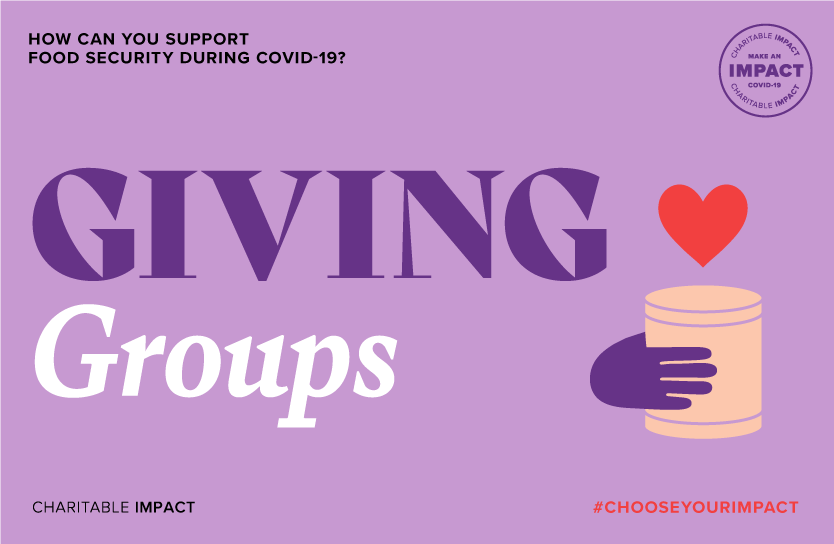Here’s how you can support access to food security right now
June 08, 2020
6 min read
Food insecurity is a complex issue and has been exacerbated by the COVID-19 pandemic. Giving to food banks is one important way to help. There are more local organizations you can support and more ways you can contribute to change.
Individuals who were struggling to access food to eat now face more obstacles due to COVID-19. Essentially, the complexity of food security has become even more multifold under conditions created by the pandemic.
We spoke about the issue with Impact Ambassadors who are part of our #ChooseYourImpact campaign. Jennifer Johnstone is President and CEO of Central City Foundation, which has a long history of addressing food and housing insecurity in Vancouver.
According to Johnstone, prior to the COVID-19 crisis there was a patchwork of programs, services, and even businesses that helped vulnerable people meet their food needs. Restrictions in the interest of public health and safety have blocked access to some of these more piecemeal solutions.
To-go food is great, except when you have nowhere to go
“In [Vancouver’s] Downtown Eastside for example, prior to COVID-19 there were food programs scattered throughout the community and there were small, affordable places for people to eat. Most people got their food security through some combination of lining up for food or being able to buy a $2 meal at Carnegie [Community Centre]. Some groups, especially faith-based groups, would come to the community and do food distribution,” said Johnstone.
“It is great to have to-go meals available to individuals struggling to access food — except when those individuals have nowhere to actually go. The reality is that there are still hundreds of people sleeping in tents and makeshift shelters on the streets of [Vancouver’s] Downtown Eastside,” she added.
Serena Caner, an Impact Ambassador and the President of the Shuswap Food Action Society, echoed the complexity of underlying causes of food insecurity. “Food behaviours are quite complex and people face many interrelated barriers — poverty, mental health issues, mobility, upbringing — that make it difficult for them to access nutritious foods.”
The impact of COVID-19 on food security
“One of the things that became clear really quickly was food security, and the huge gaps that already existed and were made more profound during this crisis,” said Johnstone.
Caner says needs have been exacerbated now that many households now have less money for purchasing food. Another effect of the pandemic is that it has magnified our view on the food system — across economic status. “COVID-19 has made us aware of certain vulnerabilities in our food system: most of our meat is processed in a small number of plants, most of our fruit harvests depend on migrant farmworkers,” said Caner.
How you can help
If you can, now is an important time to give to support food security. A Giving Group, as part of Charitable Impact’s #ChooseYourImpact campaign includes charities hand-selected by Johnstone for their exceptional value to the cause of Vancouver’s inner-city food security: the Greater Vancouver Food Bank, A Better Life Foundation, and the Potluck Cafe Society. Our partners on the #ChooseYourImpact campaign with the Vancouver Social Value Fund and the Social Innovation Academy selected charities (reviewed by Johnstone) for their impact on access to food security.
Johnstone says she has been heartened to see many grants, funding, and donations going to well-established local and national organizations, such as the Greater Vancouver Food Bank. It’s important for funds to also reach smaller charities working in the inner-city, including a Better Life Foundation.
The Potluck Cafe Society, for example, has a unique effect: it serves restrictive diets not necessarily met by all food distribution programs. As a social enterprise society, it also employs individuals from the inner city and helps maintain an integral part of the community’s economy.
“Donors who can support that dual-purpose find that it is a really impactful way to give: someone who is hungry gets fed but also someone who wants to work — and needs a supportive environment from which to do that — can work. I am a big believer that that is the kind of impact that a lot of donors want to have,” said Johnstone.
More you can do to help
“Donating to charities and nonprofit groups working on food security issues is critical as it is underfunded and very important,” said Caner.
She suggested other ways to help out: supporting local farmers and producers, growing your own food to gain an appreciation of the importance of our environment and farmers, and educating yourself on the issue of food security to better understand possible solutions.
Through #ChooseYourImpact, you can support organizations working within the Shuswap region of south-central British Columbia, including the Shuswap Food Action Society, the Shuswap Family Centre, and the Neskonlith Indian Band. You can also support access to food security in Vancouver’s Downtown Eastside.
We understand most of us don’t have the time or resources needed to make the most informed giving decisions. That’s why we have launched the #ChooseYourImpact campaign, connecting you to passionate changemakers and thought leaders — called Impact Ambassadors.
We have partnered with the Vancouver Social Value Fund (VSVF), a youth-led fund created in partnership with the Vancouver impact community, and the Social Innovation Academy (SIA), a learning initiative led by UBC Sauder Centre for Social Innovation & Impact Investing (SauderS3i). You can choose to give to a range of causes impacted and affected by the COVID-19 pandemic, including access to food security, seniors’ wellbeing, reducing violence, and Indigenous communities. More Giving Groups will be added as the campaign expands.
